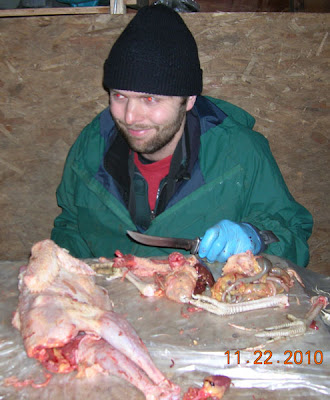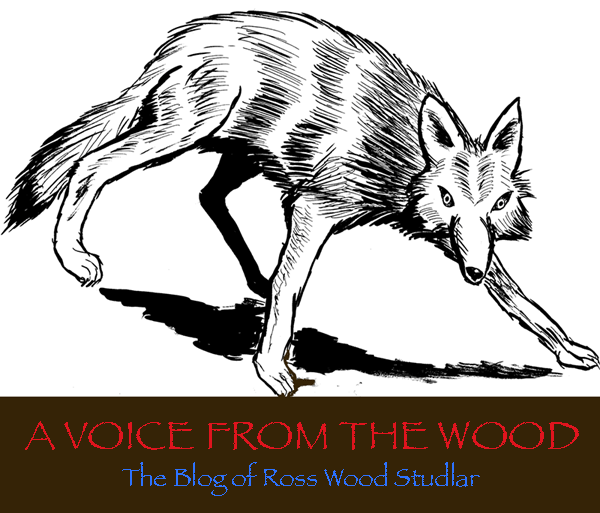
I have always loved animals. I have never been a vegan.
Although I consume dramatically fewer animal corpses per year than the average American, I have never been disciplined enough to completely purge animals or their products from my diet. I am somewhat ambivalent about the ethics of eating animals. Sometimes I agree with Peter Singer: his arguments against killing animals seem impeccable. Other times, my view is closer to that of Michael Pollan, that raising animals for meat, if done right, can be ecologically sustainable and good for animal welfare.
Every year, I have eaten turkey at Thanksgiving. This year, I 'met my meat' most directly.
Some friends in Seattle, many of whom are graduates of The Homestead, have a Thanksgiving tradition of obtaining live turkeys from a local free-range farmer, and butchering them personally. This year, I joined the effort. My initial plan was only to help with setup, takedown, and 'dressing' the birds.
For this narrative, I have given pseudonyms to my friends and associates.
It was an unusual day for Seattle. Below freezing, four inches of snow on the ground, light snow still falling. By weather, it felt like The Homestead (Ohio) in the winter.
Byron had obtained seven turkeys from a local farmer a few days prior. (We had multiple Thanksgiving dinner tables to cover.) They were fine and healthy animals. They clucked and strutted about in a pen in the backyard.
Seven persons were present. (I am not trying to sound Biblical; my numbers are accurate.) We set up the chopping block, with two nails close together pounded into it. Prepared some pots of hot water, tables and tools for dressing the birds.
Byron went into the pen, came back holding a turkey, upside-down, by its legs. Chickens and turkeys 'mellow out' when upside down; it seems to be an autonomic response. Some birds in high stress can resist the inversion sedative. This bird did just that, flapped and squawked, shed feathers; they drifted to the ground. But Byron held its legs tight.
Then he put its neck between the nails, pulled it taut. And Moab brought the axe down, missed on the first two attempts, severed the head cleanly on the third. Byron held the bird upside down as it thrashed with death throes and spattered blood all over the snow. And then he fetched the next bird. He moved efficiently, and without hesitation. He was a 'man on a mission.'
The turkey's head remained on the choppig block. Its beak continued to move as though still clucking for up to two minutes after decapitation. Someone removed it from the block and tossed it into a bucket, for the compost. (Seattle's municipal composting can even take meat and such.)
Jaya took the second turkey. I encouraged her to take several practice swings before we put the bird on the block, as she was less familiar with the axe. I was quite familiar, because I split a lot of wood in my Homestead days (and still split wood these days when the opportunity arises). She decapitated the bird. Commented that she felt her stomach fall to her knees when she did.
Byron asked me to volunteer. I asked if we had other volunteers. Adair stepped up.
Being a Homestead-trained splitter of wood, Adair cut through the bird's neck on first swing. Adair was also a religious vegetarian in his Homestead days, with some of his inspiration and reasoning based on Hinduism. I must find out what inspired his 180 degree shift.
Jeb volunteered to hold the birds in the chopping block setup while others delivered the final blows. Senga stepped up to the plate. I offered her too, a bit of coaching. I explained how chopping through wood or flesh is like baseball--keep your eye on the target. And Byron noted the need for weight on the blow as well as accuracy. (For many, the greatest dread when stepping up to the block is that one might misfire and cut but not kill on the first hit, and cause additional suffering.)
Byron then told me "two birds left, one for each of us." I took the axe with little hesitation. Byron held the bird fast. I said, "Turkey, I thank you for your blessings. And I apologize that the cycles of life are sometimes so grisly."
I began with the axe-head by my feet and swung it above my head and down onto the target in a continuous motion, like chopping wood. The axe bounced off the bird's neck, the blow accurate, but too light. I very quickly squared back up and delivered a short, solid hit. The bird's head was severed and blood gushed forth from its body, and added to the growing patch of spattered dark red on the snow.
Byron killed the last one with a short, precise, forceful swing. Like a pro.
We immersed the birds in hot water, plucked, eviscerated. They very quickly started to look more like turkeys at the grocery store do, and less like those on the farm. They have many feathers, and plucking every last one is quite a task. The removed innards smell foul.
It seemed strange how polite we were with sharing the tools around and not stepping on each others' feat when we cut up the dead turkeys. Ironic that we are so dignified to each other, after such violence to our fellow animals.
Adair and I examined the birds' anatomy as we dissected our respective turkeys. We noted the radius, ulna, bicep, windpipe, lungs, and whatever other features we could identify--all of which humans share, in slightly modified forms. Somewhere in the past, we and the turkeys have a common ancestor. Hence, we dissected our relatives.
I assisted with the slaughter of a small flock of chickens eight years ago. That was emotionally harder, in part because I had raised the birds and known their personalities. Then, I did not deliver the fatal stroke myself, but tied one bird in place so that it could be delivered. And so felt that I was part of the deed.
This was the first time that I personally dealt a bird its deathblow. A number of rationalizations went through my head before I stepped to the chopping block.
Among them:
"The turkeys are going to die today, regardless of who brings down the blade. I can volunteer my wood-chopping skills and deliver these birds a swift and expedient death, and minimize suffering."
(I do wonder if executioners of people use similar reasoning--'They'll die anyway, if I don't pull trigger someone else will.')
"I was raised a Lutheran (Christian), but am very skeptical about what they told me in church. I don't think that I must fear God's punishment. Besides, most Christians I know are hardcore meat eaters. Killing animals isn't such a bad thing, in their worldview."
Another bit of philosophizing that came to me as I cut up the turkeys is that I have no right to complain about any of the minor things that I sometimes complain about. I am so much better off than the turkeys, who are now dead.
I have a great deal to be thankful for this Thanksgiving.

